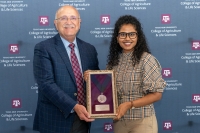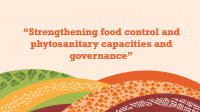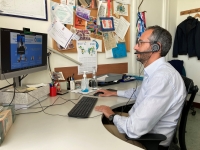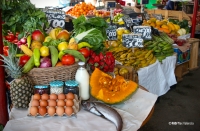News

25/05/2023
Last week, Keya Mukherjee was among three former students of the Texas A&M University, United States of America, to receive an Outstanding Early Career Alumni Award by the College of Agriculture and Life Sciences. This award, established in 2012, recognizes former students who have made exceptional contributions in their career within 15 years of graduation. Mukherjee graduated with a PhD in Biochemistry from Texas A&M University in 2018. The call for nominees attracts candidates from across the United States of America and beyond, and the selection is made through a long, rigorous process.
Mukherjee coordinates the FAO Food Systems and Food...

24/05/2023
On Wednesday, 7 June 2023, FAO is partnering with the World Health Organization, the World Food Programme and others to hold a series of events that also be accessible online. Please join us to celebrate World Food Safety Day.
The day-long celebration will include the following events:
Time: 11.00-12.00 CEST (Rome time)
Assessing food safety and plant health in 11 countries in Africa: a panel discussion
(FAO, International Plant Protection Convention Secretariat, European Union)
Hear from the team and the funders of this promising new project. What are the aims and who will benefit?
Download programme
Time: 12.15-13.30 CEST
World Food Safety Day high-level event
(FAO,...

12/05/2023
Ensuring food safety and plant health are intrinsically linked and critical elements to achieving the UN 2030 Agenda, as evidenced by the project "Strengthening food control and phytosanitary capacities and governance." Funded by the European Union and led by a team of FAO and IPPC experts, 11 African Union Member countries are conducting rigorous assessments to better understand how to improve their food control and phytosanitary systems.
Please join us in celebrating the International Day of Plant health with various events and activities planned. Click here to find out more.
Read more about the food safety and...

11/05/2023
A webinar on 11 May 2023 provided insights into how countries and international organizations can ensure that food labels and standards contribute to sustainable agrifood systems. Food labelling, which helps protect consumer health by providing safety and good nutrition information, was highlighted as one of the tools for transforming agrifood systems, along with standards, in the webinar convened by the UN Food Systems Coordination Hub.
The keynote speaker, Renate Künast, Member of the German Bundestag and former Minister of Consumer Protection, Food and Agriculture, shared three examples of using a systematic approach to instigate change: labels on food products that provide...

10/05/2023
FAO began a project last month to pave the way towards improving the food control system in the Republic of Uganda. A 5-million-euro project funded by the European Union, "Strengthening of Capacities and Governance in Food and Phytosanitary Control,” is set to provide technical support and work with Competent Authorities and other leading institutions in 11 countries that are Members of the African Union to build up capabilities, strengthen governance and improve strategic planning around two main components: food safety and plant health. As part of the food safety component, an assessment of the national food control system will be...

10/05/2023
This week marked the 11th International Symposium on Shiga Toxin (Verocyotoxin)-Producing Escherichia coli (VTEC 2023) Infections, held in Banff, Alberta, Canada. This conference, which has convened regularly since 1986,

08/05/2023
The gut microbiome is highly dynamic and complex microbial community that resides and interacts within the gastrointestinal tract. This “community” can take part in various physiological activities, such as digestion and immune function, and helps maintain intestinal and systemic homeostasis. In addition, the gut microbiome is very sensitive to environmental factors, including diet, which can have both positive and negative impacts on health. Imbalances of the gut microbiome have been associated with various disorders, including obesity, diabetes and inflammatory bowel disease.
With the advent of omics technologies, the study of the gut microbiome has taken a holistic approach, allowing for a...

20/04/2023
Climate change, sustainable production, emerging threats to agricultural and food systems, antimicrobial resistance (AMR), among others, are food safety challenges. Would you like to know more about this? How can Codex standards help you and your country? How are Belize and El Salvador planning to address those challenges?
The webinar on the future challenges in food safety will be held on 28 April 2023, in English and Spanish, 10.00 – 12.00 (GMT-5). The speakers include representatives of FAO, Belize Agricultural Health Authority and the Codex Contact Point in El Salvador. This series of webinars...

19/04/2023
The meeting of the Codex Committee on Contaminants in Food (CCCF) this week in Utrecht provided an opportunity Tuesday for discussions on FAO’s foresight programme in a FAO -hosted side event.
Vittorio Fattori, FAO Food Safety Officer, and Daniela Battaglia, FAO Animal Production Officer, were joined by Ong How Chee from the Singapore Food Agency in presenting the challenges and opportunities posed by new and emerging foods and food production systems. The presentations were followed by a question-and-answer session with an audience made up of Codex Members and Observers.
“The global agrifood system is changing,” said Fattori, as he spoke of shifting...

18/04/2023
Gene (or genome) editing is a term to cover various molecular biological techniques used for introducing changes in the genome of living organisms. These techniques can be used for many purposes, including medicines, agriculture, and food production, to name a few.
The FAO issue paper “Gene editing and agrifood systems” published in 2022 stated that gene editing technologies represent a promising new tool for plant and animal breeding in low- and middle-income countries. In fact, gene editing can be used to develop diverse traits to increase food production and quality, as well as contributing towards sustainability and climate change resilience....
Stay up to date and connect to our RSS feed!
